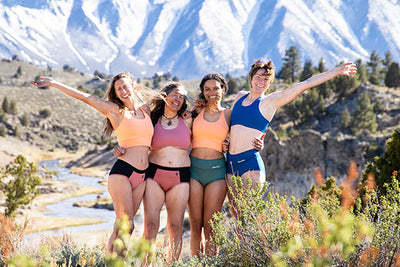Let's talk about climate change.
Climate change is real, we're past denial now. It’s pretty alarming to see the current state of our world and what it’s doing to the environment:
- Wildfires rage in the Australian outback and across the state of California.
- Droughts and heatwaves stifle the American West, as hurricanes become more frequent and intense in the North Atlantic.
- Glaciers melt in the Arctic circle and high mountain elevations which, reports Nature Journal, has led to one-third of the world’s rising sea levels.
- Not to mention other crises including the unsustainable production of plastic, and the world's current battle with COVID-19, the novel coronavirus.
Extremes in weather and temperature have made some ecosystems hostile to certain animal species. Climate change is real, and its effects on our planet need to be taken seriously.
An estimated six in 10 Americans are “concerned” or “alarmed” about how this trajectory of climate change will impact the earth’s future, according to data from Yale’s Climate Change Communication survey.
While the majority of the U.S. population does recognize that this is a crisis-level issue, this topic can still be polarizing to talk about. In fact, another joint poll from Yale and George Mason Universities found that 63 percent of Americans “rarely” or “never” discuss climate change with their friends and family.
Why Is It Often So Difficult to Talk about Climate Change?
Saber Brasher, a PhD Candidate in Climatology at the University of Delaware, feels some of the major misunderstandings that surround climate change conversations are about the system itself. She explains:
“Imagine you work as a chemist, and you walk into the lab each day to find that all of your equipment has changed, your procedures have been rewritten, and much of your chemical components have been swapped for others. Studying the climate is just like being in that lab which doesn’t have any constants—with each day and year, the variables change in their own unique, subtle ways.” – Saber Brasher | Ph.D. Candidate in Climatology at the University of Delaware
While some of these changes are natural, the rate at which many have occurred is unprecedented in geologic history—”The rapidness of change is a result of human overuse or manipulation of the planet and its natural resources.”
While much of atmospheric science is based on physics and fluid dynamics with certain laws—such as thermodynamics—that help scientists understand and hypothesize how changes to specific parts of the climate system will influence the system as a whole, Brasher has found that much of the public does not understand the science of why climate change is problematic, in spite of their unease around it.

Above Image: The Climate Change Performance Index (CCPI) is an instrument that evaluates and compares the climate protection performance of 57 countries and the European Union (EU) (Status 2020), which are together responsible for more than 90% of global greenhouse gas (GHG) emissions.
David Romps, professor of earth science at the University of California Berkeley echoes this, saying:
“There has been a well-funded campaign to spread misinformation and sow doubt about global warming […] After you finish school you learn about science primarily through the news, and if you do not get appropriate context from that news coverage, you will be confused.”
This confusion is reasonable too—with all these nebulous terms in the media like ozone depletion, carbon footprint, or greenhouse emissions, it can feel intimidating to openly discuss words and issues that we don’t have a firm grasp on.
However, research from the Proceedings of the National Academy of Sciences (PNAS) also confirms that if we just choose to wade through the discomfort and insecurity, initiating conversations about the harm of climate change will spark a “social feedback loop” that leads to more awareness, investment and, ultimately, action.
What Practical Steps Can You Take to Address Climate Change?
Shifts in atmospheric pressure from human industrialization have resulted in an increase of carbon dioxide levels from 280 parts per million to 412 parts per million in the last 150 years, according to NASA. This spike in CO2 emissions could account for the drastic weather fluctuations and environmental impacts across the globe.
And the reason for this can be confusing, which is why, Brasher suggests, “It’s easy to hear this and think about how massive the planet is or how large-scale these problems are, then become overwhelmed or feel helpless to effect change.”
The good news is, there is something you can do, despite how confusing it can be to actually understand WHY it’s all happening.
We love Brasher’s philosophy:
“1,000 small efforts in the right direction are better than just one overhaul. If we, as a human population, can all be inspired to care about our climate—which I genuinely think is the first step to mobilize any group of people into action—these small initiatives can amount to sustainable, meaningful shifts.” – Saber Brasher | Ph.D. Candidate in Climatology at the University of Delaware
So what are some immediate, actionable measures we can take to reduce our own impacts and be an example to others? Brasher gives us the following ideas:
- Break down the primary routines, activities, and lifestyle choices we practice on a daily basis: what we eat, what we wear, how we move, and what we do.
- Animal agriculture is another main contributor to greenhouse emissions, so any decrease in our meat intake or animal products can lessen those emissions.
- Purchase from small businesses who make clothing and other products with ethically sourced materials, as opposed to fast-fashion manufacturers who use the cheapest materials they can find. These manufacturing processes often lead to exploited working conditions too—a separate but equally important issue.
- Walk, ride a bike, carpool, or take public transit if these are safe and physically accessible options.
- Choose reusables over single-use items.
- Find new ways to repurpose glass or plastic jars, containers, bottles, and other items.
Even More Sustainability Action Steps
Based on data collected by the Keep America Beautiful initiative, if each person in the United States were to recycle one plastic bottle, 54 million shirts, and 6.5 million fleece jackets could be produced. If we all recycled one aluminum can, the amount of greenhouse emissions we could save is equal to taking 6,750 vehicles off the road. And if we all recycled one plastic bag, 28,906 park benches could be constructed from that material.

On that note, here are additional ways to be more sustainable‚ both individually and as a culture. The fact remains that climate change is real—but so are the solutions.
Groceries & Kitchen:
- Switch to washable and reusable paper towels.
- Avoid placing fruits and vegetables in plastic bags.
- Shop for bulk dry items at the grocery store and use your own fabric bags.
- Switch to compostable or 100% recycled trash bags.
- Do not purchase groceries in plastic packages—look for recyclable glass, cardboard or aluminum packages instead.
- Reuse glass bottles, jars and other packages that are already on-hand, rather than purchasing new items for storage.
- Use reusable silicone bags instead of zip-lock plastic bags.
- Decline to-go plastic bags or excess packages from restaurants.
- Bring your own reusable mug or thermos for coffee.
- Consume fewer animal products or eliminate them from your diet altogether.
- Recycle in your home and compost any produce scraps.
Clothing & Fashion:
- Shop at thrift stores, rather than purchasing new items.
- Purchase new items infrequently and be selective on where to spend money.
- Purchase only new items that will last and that you will love into the ground.
- Mend and patch old clothes, rather than throwing them out.
Modes of Travel:
- Ride a bike instead of driving a car for short trips.
- Minimize long-distance travel by plane.
- Consider a hybrid or energy-efficient vehicle.
- Bring a reusable trash bag to beaches or outdoor spaces to collect any visible waste products.
Social Interactions:
- Discuss environmental topics and share ideas on how to make a sustainable difference with your peers or family
- Back policies and politicians whose campaigns or platforms include plans for minimizing our human impact on the climate.
Climate Change is Real—and So Is Your Power
Climate change is real and scary—but the little things you do help make a difference. Use the facts to start up a conversation and the tips to make lifestyle changes that affect everyone around you. As Brasher says:
“Our voices together can promote change. As individuals we can analyze our own consumption patterns and examine our environmental footprints. Armed with this valuable information, we can then share it in a loving and compassionate way to encourage our friends or family to make those changes as well.” – Saber Brasher | PhD Candidate in Climatology at the University of Delaware

Written in collaboration with Saber Brasher
If you have any questions or would like to get more information about climate change you can reach out to Saber directly at sbrasher@udel.edu.
Here's more about Saber: "I am currently a Ph.D. Candidate in Climatology at the University of Delaware. My dissertation, or research specialty, in a nutshell, is actually on how a changing cryosphere (Earth's ice and snow) modifies the radiation balance and therefore impacts climate across the planet. Snow/ice are complicated in that they are both a direct responder to climate (so are sensitive to even small changes) but also a contributor to change (the surface cover type has a large influence on how energy travels through the earth-system). With the accelerated rate of Arctic sea ice melt and changing snow cover regimes, there are many questions as to how climate will be influenced (that I am trying to answer haha). I did my bachelors at Texas State in Physical Geography, and my masters there as well. I have been at UDel three years, and am working on other climate-related research projects here separate from my dissertation topic as well. I have been teaching (either as a lab instructor, or more recently as the full professor) for the past five years now."
Welcome to the Journal: official blog of Tera Kaia Basewear.
Here we tell stories about the outdoors, sustainability, and life through the lens of outdoor women. Get the latest on TK events, and a "behind the seams" look at everything that's going on with our brand.
























